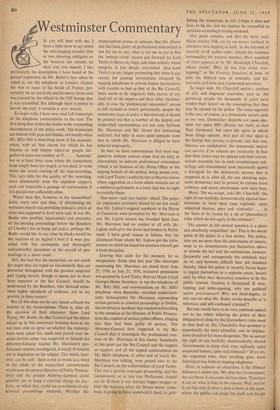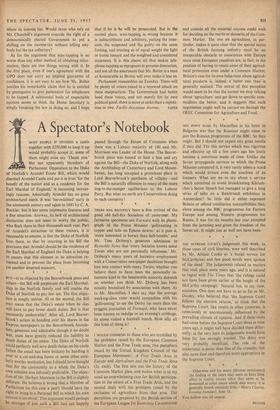Westminster Commentary
To begin with, I have now read full transcripts of the telephone conversations in the case. The first thing that strikes the reader is the outstanding incompetence of the police work. The transcripts are littered with gaps and blanks, not merely when Mr. Billy Hill is describing some of his acquaint- ances, with all that charm for which he has become so well known wherever people for- gather to razor one another, as `F bastards,' but in at least forty cases where the transcribers have simply been too stupid, or too deaf, to write down the words coming off the tape-recording. This says little for the quality of the recording, since presumably even the stupidest copper's nark can transcribe a passage of conversation if it is played over sufficiently often.
Worse than this, however, is the transcribers' habit, every now and then, of abandoning the verbatim record and providing instead a précis of what was supposed to have been said. It was Mr. Butler who prattled, inaccurately and evasively, of the pending proceedings before the Benchers of Lincoln's Inn as being sub judice; perhaps Mr. Butler would like to say what he thinks would be the reaction of an Appeal Court if it were pro- vided with this incomplete and thoroughly untrustworthy document as the record of pro- ceedings in a lower court.
Still, the fact that the transcripts are not worth the paper they are typed on (incidentally they are showered throughout with the grossest misprints and typing errors), though it seems not to have been apparent to the Bar Council, should be understood by the Benchers, who demand some- what higher standards of evidence, not to say, probity, in these matters.
But all this does not by any means exhaust the interest of the transcriptions. There is, after all, the question of their character. Since Lord Tenby, Mr. Butler, the Bar Council and the others mixed up in this unsavoury business have so far not been able to agree on whether the transcrip- tions were asked for, made and passed over be- cause serious crime was suspected or because the Attorney-General wanted Mr. Marrinan's pro- fessional conduct investigated, it would ill become me to dogmatise on the subject. This much, how- ever, can be said : there is not so much as a word in the whole of the transcribed conversations which even the present Director of Public Prosecu- tions and the present Attorney-General could possibly use to hang a criminal charge on any- body, or which they could use as evidence in any criminal proceedings whatever. Whether the transcriptions prove, or indicate, that Mr. Marri- nan has been guilty of professional misconduct is not for me to say; what is for me to say is that the 'serious crime' excuse put forward by Lord Tenby is blown sky-high, and since nobody whose integrity is less deeply committed than Lord Tenby's is any longer pretending that there is any excuse for passing information obtained by tapping telephones to private bodies (particularly with records as bad as that of the Bar Council), there seems to be singularly little excuse of any kind left to the tappers and their allies. Incident- ally, in case the 'professional misconduct' excuse is still inclined to twitch galvanically, despite the numerous coups de grace it has received, it should be pointed out that a number of the tapped and transcribed conversations are not only between Mr. Marrinan and Mr. Ganes (his instructing solicitor), but refer to cases quite separate from that in which Mr. Marrinan is alleged to have behaved improperly.
So here we have conversations that were sup- posed to indicate serious crime (but do not), or alternatively to indicate professional misconduct (which is no business of the Home Office or the tapping branch of the police), being passed over, with Lord Tenby's authority but at Heaven knows whose suggestion, in a form which reminds one of a mediaeval palimpsest, to a body that has no right to consider them.
One more—and very horrid—detail. The popu- lar impression (certainly shared by me last. week) that Mr. Lipton's original questions in the House of Commons were prompted by Mr. Marrinan is not, Mr. Lipton assures me, founded 4on fact; Mr. Marrinan had no contact at all with Mr. Lipton until after the storm had broken in Parlia- ment. I have good reason to believe that the informant from whom Mr. Lipton got the infor- mation on which he based his question himself got it from the police.
Leaving that aside for the moment, let us reeapitulate. Some time last year (the intercepts concerning Mr. Marrinan are dated from June 27, 1956, to July 25, 1956, inclusive) permission was granted by Lord Tenby, then (as Major Lloyd George) Home Secretary, to tap the telephone of Mr. Billy Hill, and conversations on Mr. Hill's telephone were thereafter recorded indiscrimin- ately. Subsequently Mr. Marrinan, representing certain persons in criminal proceedings in Dublin, was involved in incidents that resulted in his calling to the attention of the Director of Public Prosecu- tions the conduct of certain police officers, alleging that they had been guilty of perjury. The Attorney-General then suggested to the Bar Council that it investigate the professional con- duct of Mr. Marrinan in this matter. Somebody at this point put the Bar Council and the tappers en rapport, and all the tapped conversations on Mr. Hill's telephone, at either end of which Mr. Marrinan was talking, were passed over to the Bar Council, on the authorisation of Lord Tenby.
This was a grossly improper proceeding, and the Government, or at any rate Parliament, should say so. If there is any attempt hugger-mugger to inter the business when the House meets, some- body is going to fOrce somebody's hand by pub- lishing the transcripts in full. I hope it does not have to be me, lest my readers be compelled to spend an exceedingly boring weekend.
One point remains, and that the most vital. Many worthy folk arc by no means inclined to condemn wire-tapping as such, 'in the interests of security' or of 'public order,' despite the nastiness surrounding the present instance. Most muddled of these ,appears to be Mr. Randolph Churchill, whose article, ,'Why all this fuss about wire- tapping'?' in the Evening Standard of June 14 puts the illiberal case as concisely, and fal- laciously, as I have seen it presented anywhere.
. To begin with, Mr. Churchill makes a number of silly and dogmatic assertions, such as 'All grown-up people for thousands of years have written their letters' on the assumption that they may be opened by the police. The exact opposite is the case, of course, in a democratic society such as our own. Democracy depends not upon elec- tions nor upon MPs (Russia has both, as had Nazi Germany), but upon the spirit in which these things operate. And part of that spirit is the feeling that privacy is private, and that con- fidences are confidential. No democratic society can survive if its citizens are constantly in fear that their letters may be opened and their conver- sations recorded; for in such circumstances sub- terfuge and concealment must necessarily spawn a disregard for the democratic process that is supposed (it is, after all, the one clinching argu- ment democracy has) to protect its citizens from arbitrary and secret interference with their lives.
More; `Do we accept,' asks Mr. Churchill, 'the right of our lawfully, democratically elected Gov- ernments to keep their eyes vigilantly upon suspected traitors, spies and criminals'? . . . ls the State to be bound by a set of Queensberry rules which do not apply to the criminal?'
The answer to the second question is a plain and absolutely-unqualified 'yes.' This is the whole point of the police in a free society. The police, who are no more than the instruments of society, must in no circumstances put themselves above or outside the law and the cOnventions, however frequently and outrageously the criminals may do so, and however difficult their job becomes thereby. Once the police or security forces begin to regard themselves as a separate estate, bound only by what they themselves conceive to be the public interest, freedom is threatened. If wire- tapping and letter-opening, why. not political agents provocateurs? Why not third-degree, at any rate on what Mr. Butler would describe as 'a notorious and self-confessed criminal'?
But one would have to be very confused indeed not to see where relieving the police of their obligation to abide by the Queensberry rules must in time lead us. Mr. Churchill's first question is superficially far more plausible, and its implica- tions therefore far more dangerpus. `Do we accept the right of our lawfully, democratically elected Governments to keep their eyes vigilantly upon suspected traitors, spies and criminals?' If we do, the argument runs, then anything goes, from listening at key-holes to tapping telephones.
Here, in reductio ad absurdum, is the illiberal democrat's entire case. We elect the Government; we can throw it out come election-time. Therefore it can do what it likes in the interim. Well, maybe it can but only if what it does is done in the open, where the public can judge for itself and decide where its interest lies. Would those who rely on Mr. Churchill's argument concede the right of a democratically elected Government to put a shilling on the income-tax without telling any- body but the tax callecto,rs?
As for the argument that wire-tapping is no worse than any other method of obtaining infor- mation, there are two things wrong with it. In the first place, even if one's agreement with the GPO does not carry an implied guarantee of confidence, it is not easy to see how Mr. Butler justifies his remarkable claim that he is entitled by prerogative to give permission for telephones to be tapped. A substantial body of respectable opinion seems to think the Home Secretary is simply briaking the law in doing so, and I hope that if he is he will be prosecuted. But in the second place, wire-tapping is wrong because it is indiscriminate and arbitrary, putting the inno- cent, the suspected and the guilty on the same footing, and treating as of equal weight the light or ironic remark and the weighted and considered statement. It is this above all that makes tele- phone-tapping so repugnant to genuine democrats, and not all the assurances that Mr. Butler is a man as honourable as Brutus will ever make it less so.
Parliament reassembles on Tuesday. There will be plenty of voices raised in a renewed attack on these malpractices. The Government had better heed these voices, and not merely for its own political good; there is more at stake than.a reputa- tion or two. Facilis descensus Averno. TAPER



































 Previous page
Previous page